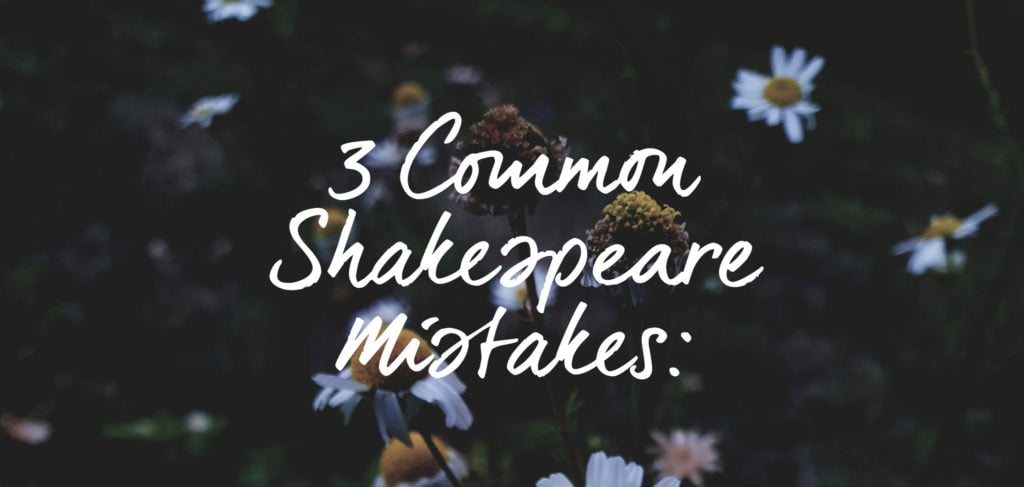
3 Shakespeare Mistakes (Early Career Actors Make)
You probably first came across Shakespeare in high school; likely, you tried not to doze off as your English or Literature teacher did their best rendition of Hamlet or Macbeth. You may have even seen a few productions, of varying quality, in your time. And now you need to prepare a Classical monologue for a drama school audition. Or maybe you’ve been cast in one of Shakespeare’s plays. What are some common pitfalls to avoid when preparing for and performing Shakespeare? Here are some avoidable mistakes that early-career actors make all too often.
Listen to the audio version of this page…

#1 The “Shakespeare Voice”
I’m starting with this because it’s the most common mistake I see. This dated idea of the proper or correct Shakespearean voice isn’t just dying out; it’s dead. All over the world, we have witnessed a move away from adopting the RP (Received Pronunciation) dialect for performing Shakespeare and embraced performing Shakespeare in your own voice. Now if you’re from England, and you’re young, and for some reason, you already speak in the RP dialect, that’s great. Keep calm and carry on. But for the rest of us, putting on this foreign voice because we think it’s the way Shakespeare needs to be delivered is not only limiting, but a little cringy to watch. Firstly, it’s very likely you’re not performing a competent RP dialect in the first place, but merely an approximation of one. It also gives off the impression that you believe the text and the role exist outside of you and that they are something that you, in the here and now, couldn’t possibly inhabit. And most importantly, it robs the text, and your work, of the ability to have relevance and significance to the audience you’re performing for. Shakespeare wrote his plays to reflect his society’s present, and it’s our job to honour his text by doing the same in our own cultural and geographic context. I mean, Shakespeare said it himself:
“For anything so overdone is from the purpose of playing, whose end, both at the first and now, was and is to hold, as ‘twere, the mirror up to nature, to show virtue her own feature, scorn her own image, and the very age and body of the time his form and pressure.”
– Hamlet Act 3 Scene 3
Something pretty significant to note is that Shakespeare’s plays were certainly not performed in RP in his time. There has been a lot of work done on understanding the OP (Original Pronunciation) of Shakespeare’s plays, and if you do some research, you will find that OP sounds almost nothing like RP. The tradition (trend) of performing Shakespeare in RP is a fairly recent one, and the days when you needed to speak Shakespeare in RP to be taken seriously as an actor are thankfully behind us.
#2 Not knowing the words
Before you scroll past, I don’t mean not knowing your lines, I mean not understanding the actual words Shakespeare has used. As is the case with many old texts, language has since evolved and changed, changing with it the meaning of the language; therefore, it’s of critical importance that you understand what the words would have meant to Shakespeare and his audiences, as well as what the words mean in a contemporary setting. And this couldn’t be easier, I promise. We are lucky to be living in a time when people have already done a lot of this work for us! Ben and David Crystal are a father and son team who are experts on Shakespeare’s words and the Original Pronunciation of Shakespeare’s plays. They have published an incredible resource called Shakespeare’s Words: A Glossary and Language Companion. In it, you can look up individual words from Shakespeare’s text, and find the meanings of the word. Yes, meanings multiple! Because for each word, Ben and David have done the meticulous work of considering it within the context of the specific play and line you’re looking at. Even ordinary words, that you think you know the meaning of, are worth looking up. You will be so pleasantly surprised by what you excavate here, and how this information can fuel your performance of this rich language.
For words that are not listed in Shakespeare’s Words, I recommend looking them up in a dictionary (preferably the Oxford English Dictionary) to find the exact definition (or definitions) and the etymology of the word. Shakespeare is all about text, and though this may seem like an overwhelming amount of work, and it’s difficult to imagine how this translates to your work on stage, I promise you, it will. The better you know what you’re saying, the better your audience will.
#3 Not rising to the language
It may be tempting as an early career actor, and once you understand deeply the text you’re working with, to try and make it sound as casual and contemporary as possible. There’s a strong desire to make sure that all the work you’ve done comes across in performance, and in trying to make it as natural and contemporary as possible, you bring it ‘down’ to a level that you think your audience will be able to understand easily. But what you really should be doing, if you want the richness of the language to be understood, is rise to it. Now I know this is going to sound contradictory to what we talked about in mistake #1 about putting on a funny ‘Shakespeare’ voice, but it’s not; it’s a balancing act. While you want to speak from your cultural context, and in your own voice, you need to work to make it the most flexible, gymnastic, expressive version of your voice possible. Because the text demands it. Depending on where you’re from in the world, your everyday speaking voice may have a limited pitch range, or you may cut short certain vowel sounds. None of these is a ‘wrong’ way to speak, but they can limit your ability for expression. You can find more range and flexibility by being open to exploring the text in a variety of ways. Instead of reading the words out loud once, and fixing that reading as habitual, keep yourself open to all the different ways you can say those words, and express those meanings. Give yourself plenty of time (and the permission) to do this, out loud and on your feet, not only in the rehearsal room, but before it in your own actor’s preparation. There are as many ways to speak the text as there are actors in the world, but this doesn’t mean you should be limited by your first choice. Attempt a bunch of different explorative exercises with yourself; play with range, pitch, emphasis, pause, volume, vowels, consonants, etc. and you will be freer to play with your fellow actors in the rehearsal room, not locked into your first and only option.
If you are struggling with this, and you find that you’re stuck in ‘casualness’, remind yourself of the stakes and given circumstances of your character. We don’t often meet Shakespeare’s characters on any old day of their lives; we meet them on the most critical and dramatic day of their lives. What would you sound like on that day of your life? As opposed to a standard Tuesday morning. That’s the voice we’re looking for when performing Shakespeare.
Conclusion
If you can get through your early career performing Shakespeare, and avoid these three mistakes, you will be on a better path than most. Hopefully, you’ve found these tips a helpful starting point for thinking about and exploring how to approach Shakespeare’s generous language. Remember, there’s no one way to perform Shakespeare, and all of the most influential Shakespearean actors brought something new to the text; they innovated in a way that was previously not thought possible, and that’s what made them special. Your unique approach makes your reading and performance of a character special, but you will only unlock this potential by doing the work.
If you know of any other mistakes that you see all of the time and wish you didn’t, let us know in the comments below!

Leave a Reply